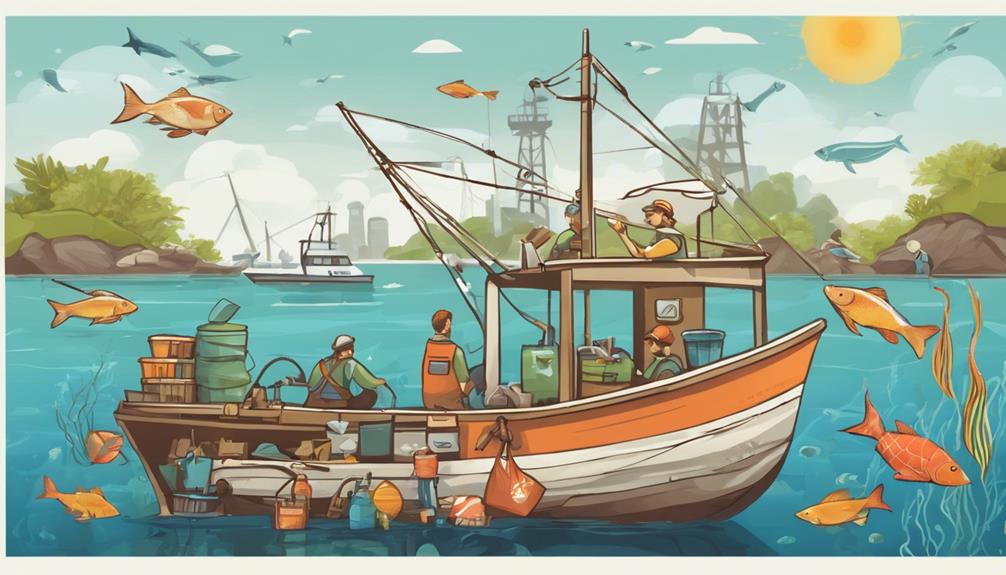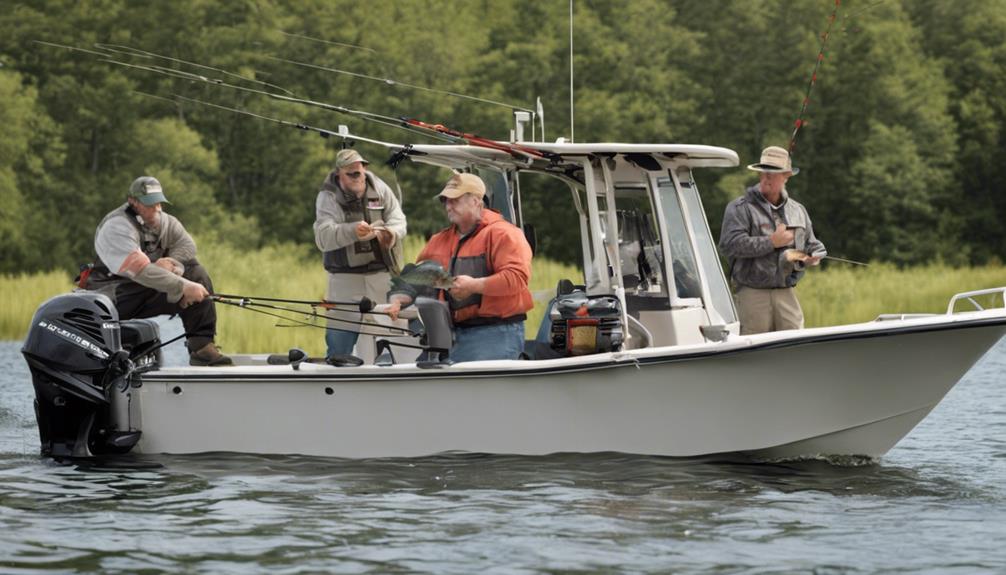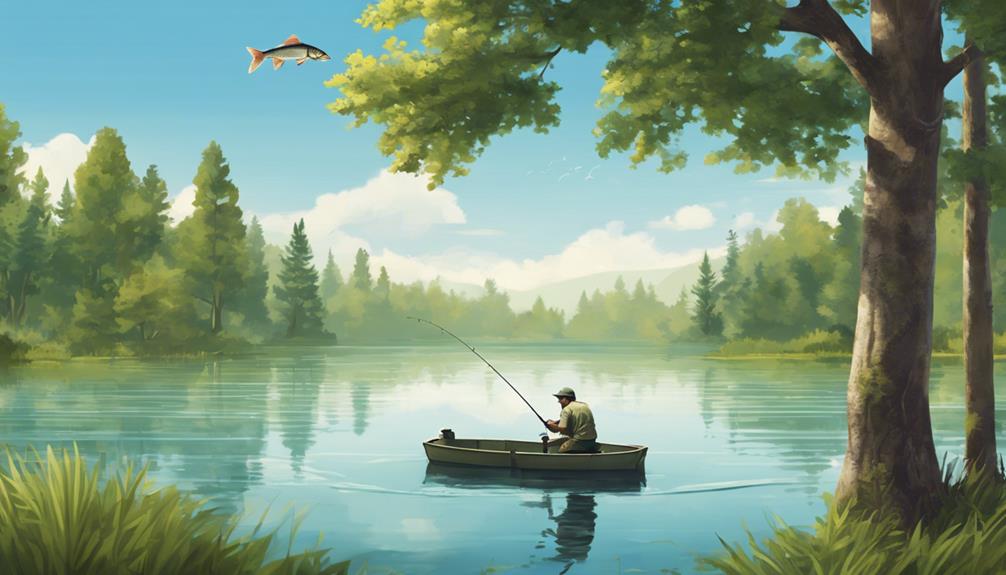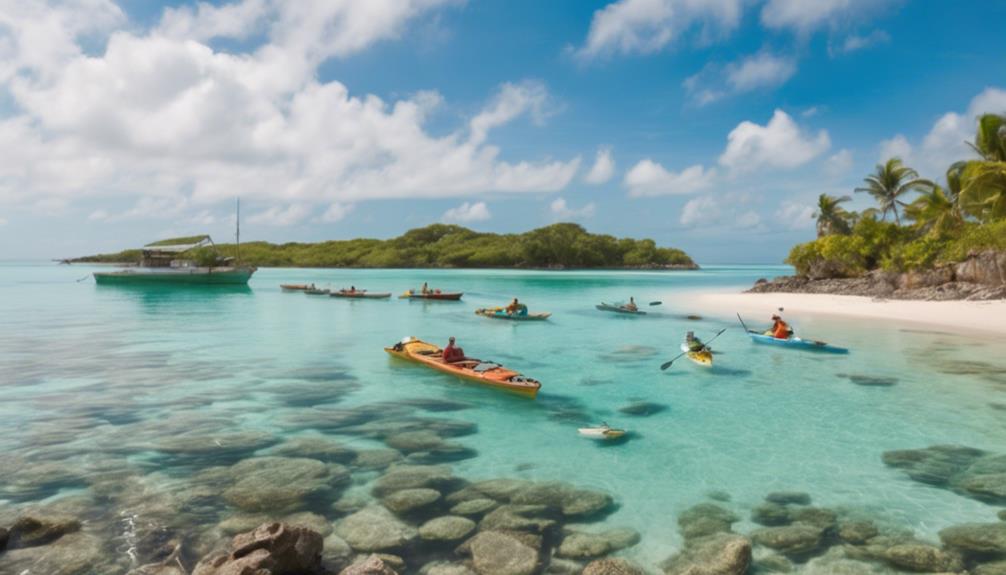When it comes to navigating the turbulent waters of climate change in fishing conservation, it's essential to have a sturdy anchor. But what exactly can you do to weather the storm and ensure a sustainable future for marine ecosystems?
Stay tuned as we explore six practical tips that can help you steer towards more resilient and responsible fishing practices in the face of environmental challenges.
Understanding Climate Change Impacts
To grasp the urgency of fishing conservation in combating climate change, you must first understand how climate change impacts marine ecosystems. Climate change is causing shifts in ocean temperatures, sea levels, and ocean chemistry, leading to disruptions in marine habitats and ecosystems. These changes are affecting the distribution and abundance of fish species, altering their breeding patterns, and in some cases, threatening their survival. Understanding these impacts is crucial in developing effective adaptation strategies to mitigate the effects of climate change on marine life.
One key aspect of understanding climate change impacts is recognizing the interconnectedness of marine ecosystems. Changes in one species population can have cascading effects throughout the food chain, impacting other species and altering the overall ecosystem balance. This interconnectedness underscores the importance of implementing conservation measures that consider the broader ecosystem dynamics rather than focusing solely on individual species.
In light of these challenges, adaptation strategies are essential for fisheries management. These strategies may include implementing sustainable fishing practices, establishing marine protected areas, and monitoring and regulating fishing activities to ensure the long-term health of fish stocks. By adapting to the changing environmental conditions and implementing conservation measures, fisheries can better withstand the impacts of climate change and ensure the sustainability of marine resources for future generations.
Sustainable Fishing Practices
Understanding the impact of sustainable fishing practices is crucial in mitigating the effects of climate change on marine ecosystems. By adopting eco-friendly techniques and practicing responsible harvesting, you can help ensure the long-term health and sustainability of our oceans.
Eco-friendly techniques such as using selective fishing gear, implementing fishing quotas, and establishing marine protected areas can help reduce the impact of fishing activities on marine biodiversity. Selective fishing gear, like circle hooks and turtle excluder devices, minimizes bycatch and prevents harm to non-target species. Fishing quotas regulate the amount of fish that can be harvested, preventing overfishing and allowing fish populations to replenish. Marine protected areas are designated regions where fishing activities are restricted, providing safe havens for marine life to thrive.
Responsible harvesting involves respecting catch limits, avoiding destructive fishing practices, and supporting sustainable seafood choices. By adhering to catch limits set by fisheries management organizations, you can prevent the depletion of fish stocks and maintain a balanced ecosystem. Avoiding destructive practices like bottom trawling, which can damage sensitive habitats like coral reefs, helps protect marine biodiversity. Supporting sustainable seafood choices by consuming species that are responsibly harvested ensures that fish populations are managed effectively.
Incorporating these eco-friendly techniques and engaging in responsible harvesting practices are essential steps in promoting sustainable fishing and combating the impacts of climate change on our marine ecosystems.
Promoting Marine Biodiversity
By actively supporting conservation efforts, you can play a crucial role in promoting marine biodiversity. One effective way to do this is by advocating for the establishment and protection of marine sanctuaries. These designated areas help preserve critical habitats and provide safe spaces for marine species to thrive without the threat of overfishing or habitat destruction. By supporting the creation of marine sanctuaries, you contribute to the overall health and diversity of marine ecosystems.
Another essential aspect of promoting marine biodiversity is habitat restoration. Degraded habitats can negatively impact marine species, leading to population declines and loss of biodiversity. Participating in habitat restoration projects, such as coral reef restoration or mangrove reforestation, can help revitalize ecosystems and create essential breeding grounds for marine life. By volunteering or donating to organizations involved in habitat restoration efforts, you actively contribute to the conservation of marine biodiversity.
Promoting marine biodiversity through the establishment of marine sanctuaries and habitat restoration is crucial in the fight against climate change. These actions not only protect vulnerable marine species but also enhance the resilience of marine ecosystems to environmental stressors. By taking a proactive role in supporting these initiatives, you can make a significant impact on the conservation of marine biodiversity for future generations.
Adapting to Changing Ecosystems
As marine ecosystems face unprecedented changes due to climate change, adapting to these shifting environments becomes imperative for the preservation of biodiversity. Ecosystem resilience is key to ensuring that marine life can withstand and recover from the impacts of climate change.
Here are four essential adaptation strategies to help fishing conservation efforts thrive in changing ecosystems:
- Diversify Fishing Practices: Embrace a variety of fishing methods that are less harmful to the environment. Avoid over-reliance on single techniques to reduce the pressure on specific species and habitats.
- Implement Marine Protected Areas: Establish protected zones where marine life can thrive undisturbed. These areas help preserve biodiversity, rebuild fish populations, and serve as a source for replenishing surrounding areas.
- Monitor and Adapt: Continuously monitor changes in marine ecosystems and adjust fishing practices accordingly. By staying informed and flexible, you can better respond to shifts in fish populations and their habitats.
- Community Engagement: Involve local communities in conservation efforts. By working together with stakeholders, you can develop sustainable solutions that benefit both the environment and the livelihoods of those dependent on fishing.
Advocating for Policy Changes
Advocating for policy changes is crucial in driving meaningful progress towards sustainable fishing practices in the face of climate change. By engaging in lobbying efforts and advocating for policy reform, you can actively contribute to shaping regulations that promote responsible fishing practices and protect marine ecosystems.
One effective way to advocate for policy changes is to join forces with environmental organizations and industry stakeholders to amplify your voice. By collaborating with like-minded individuals and groups, you can enhance your lobbying efforts and increase the likelihood of policy reforms that prioritize sustainability.
Another strategy is to stay informed about current policies and regulations affecting fishing practices. By being aware of existing laws and their implications, you can identify areas that require reform and advocate for changes that align with sustainable fishing practices.
Additionally, leveraging scientific research and data to support your advocacy efforts can strengthen your arguments for policy reform. Providing policymakers with evidence-based information can underscore the importance of implementing regulations that safeguard marine resources for future generations.
Engaging in Community Outreach
To effectively promote fishing conservation efforts in combating climate change, actively engaging with local communities is essential. Community outreach plays a crucial role in raising awareness, fostering collaboration, and implementing sustainable practices. By connecting with the people who rely on fishing for their livelihoods and recreation, you can make a tangible impact on conservation efforts.
Here are four effective strategies to engage in community outreach:
- Educational Workshops: Host informative workshops to educate community members about the importance of sustainable fishing practices, the impacts of climate change on marine ecosystems, and ways they can contribute to conservation efforts. These workshops can empower individuals with the knowledge needed to make informed decisions that benefit the environment.
- Local Partnerships: Collaborate with local organizations, businesses, and community leaders to amplify your conservation message. By forming partnerships with key stakeholders, you can reach a broader audience, access additional resources, and work together towards common conservation goals.
- Community Events: Organize community events such as beach clean-ups, fishing clinics, or marine conservation days to bring people together in support of fishing conservation. These events create opportunities for hands-on involvement and foster a sense of community pride in environmental stewardship.
- Youth Engagement: Engage with schools, youth groups, and scouting organizations to involve the next generation in fishing conservation efforts. By educating and inspiring young people, you can cultivate a lasting legacy of environmental awareness and responsibility within the community.
Monitoring and Research Initiatives
Implementing robust monitoring and research initiatives is crucial for assessing the impact of fishing activities on marine ecosystems and informing effective conservation strategies in the face of climate change. Data analysis plays a key role in understanding trends, identifying areas of concern, and evaluating the effectiveness of conservation measures. By analyzing data collected through monitoring programs, researchers can pinpoint changes in fish populations, habitat degradation, and other indicators of ecosystem health affected by climate change. This information is invaluable for making informed decisions and adapting management strategies to mitigate negative impacts.
Advancements in technology have revolutionized monitoring and research in the fishing industry. Tools such as satellite tracking, acoustic telemetry, and underwater drones provide researchers with real-time data on fish movements, habitat utilization, and environmental conditions. These technologies enable scientists to gather precise information over large spatial scales, offering a comprehensive view of ecosystem dynamics. By harnessing the power of technology, researchers can monitor changes in marine environments more effectively, leading to targeted conservation efforts and sustainable fisheries management practices.
Through a combination of rigorous data analysis and the integration of cutting-edge technologies, monitoring and research initiatives are essential for safeguarding marine ecosystems in the face of climate change. By staying informed and embracing innovative approaches, stakeholders can work together to ensure the long-term health and sustainability of our oceans.
Collaboration With Conservation Organizations
Collaborating with conservation organizations enhances the collective effort towards marine ecosystem preservation and climate change mitigation. By working together, you can make a more significant impact on fishing conservation and sustainability.
Here are four ways collaboration with conservation organizations can benefit your efforts:
- Funding opportunities: Partnering with conservation organizations can provide access to various funding sources dedicated to marine conservation projects. These funds can support research, conservation initiatives, and sustainable fishing practices, helping you make a more significant impact.
- Educational resources: Conservation organizations often have educational materials and resources that can help you and your community better understand the importance of sustainable fishing practices. These resources can include workshops, training programs, and informational materials that promote awareness and knowledge sharing.
- Networking opportunities: Collaborating with conservation organizations allows you to connect with like-minded individuals and groups who share your passion for marine conservation. Networking can lead to valuable partnerships, knowledge exchange, and collective action towards shared conservation goals.
- Policy influence: Working with conservation organizations can amplify your voice and advocacy efforts in influencing policies that support sustainable fishing practices and marine conservation. By joining forces, you can advocate for stronger regulations, conservation measures, and environmental protections to combat climate change effectively.
Frequently Asked Questions
How Can Individual Fishermen Reduce Their Carbon Footprint to Combat Climate Change in Fishing Conservation?
To lower your carbon footprint in fishing conservation, adopt sustainable practices. Make conscious choices like using eco-friendly gear and reducing fuel consumption.
Every individual action counts in combating climate change. Support initiatives that promote responsible fishing practices and protect marine ecosystems.
What Role Do Invasive Species Play in Impacting Marine Biodiversity and How Can They Be Managed?
When it comes to managing invasives and protecting biodiversity, understanding the impact of invasive species on marine ecosystems is crucial. These non-native species can disrupt the balance of marine environments, leading to the decline of native species and overall biodiversity.
To combat this, strategies like early detection, rapid response, and ecosystem restoration are essential. By actively managing invasives, you can help preserve the health and diversity of marine ecosystems.
How Can Fishermen Adapt Their Practices to Shifting Marine Ecosystems Due to Climate Change?
To adapt your fishing practices to shifting marine ecosystems due to climate change, start by understanding the changes happening in your fishing grounds.
Consider reducing your carbon footprint by using fuel-efficient engines and gear.
Embrace sustainable fishing methods and support marine conservation efforts.
Your individual efforts can make a difference in preserving marine biodiversity and ensuring a healthy future for fishing communities.
What Specific Policies Are Currently in Place to Address Climate Change in Fishing Conservation?
To address climate change in fishing conservation, specific policies are crucial. Government regulations play a key role in enforcing sustainable practices within the fishing industry. International agreements also help in coordinating efforts globally. Additionally, carbon offsetting initiatives are being implemented to reduce the environmental impact of fishing activities.
How Can Local Communities Be Directly Involved in Climate Change Initiatives Related to Fishing Conservation Efforts?
To get local communities involved in climate change initiatives for fishing conservation, focus on community engagement and sustainability practices.
Encourage participation in clean-up events, educational workshops, and policy advocacy. By involving locals in decision-making processes, you can ensure that initiatives align with community needs and values.
Implementing sustainable fishing practices together won't only benefit the environment but also strengthen community bonds and promote long-term conservation efforts.
Conclusion
In conclusion, by implementing sustainable fishing practices, promoting marine biodiversity, and advocating for policy changes, you can make a significant impact in combating climate change in fishing conservation.
Adapting to changing ecosystems, engaging in community outreach, and supporting monitoring and research initiatives are also crucial steps.
By collaborating with conservation organizations and working together with others, you can help protect our oceans and preserve them for future generations.
Take action now to make a difference!



